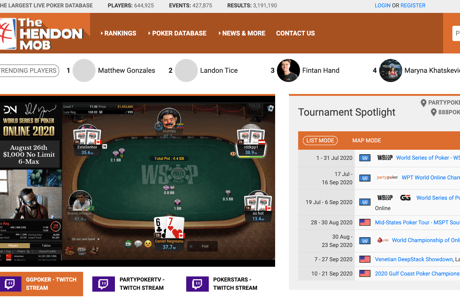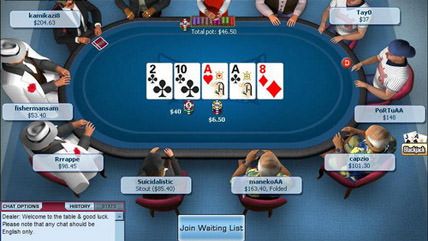Is Online Poker Illegal In Us
Also, if you are planning to operate an online gambling site, stay outside of the United States. You must also deal only with casino and poker wagers (not sports bets) from people in the US. And you cannot take bets over the phone from people in the United States. Accepting online gambling advertising is also illegal. It is not illegalfor an poker player to engage in an online poker game. It is, however, illegal to operate an online poker site from within the United States without the proper license. Poker players can still enjoy playing online poker at any of the following online poker sites for Americans.
Is online poker legal in the USA today? The answer is depends on what state you live in.
State-regulated, real-money online poker is legally available in only a handful of states.
As of July 2020, players in New Jersey, Nevada, Pennsylvania, and Delaware enjoy access to legal online poker sites. Michigan and West Virginia have passed legislation to make online poker legal, but the launch of products is pending in those states.
The following is a brief overview of US states with legal online poker, as well as the specific poker sites that are available in those states.
Click to jump to a section:
The 4 USA States with Legal Online Poker
1. New Jersey
New Jersey hosts the largest legal online gambling industry of any US state.
Players in the Garden State can choose from an extensive selection of legal online casinos and sportsbooks. New Jersey is also one of four US states with online poker.
Online poker launched in New Jersey in November 2013. State-regulated online poker sites in New Jersey include:
WSOP/888 Poker Network
WSOP New Jersey and 888 Poker NJ operate as two different skins, but both contain the same player pool. This player pool also links to WSOP Nevada and the 888 Poker network of poker sites in Delaware.
World Series of Poker online bracelet events can be played through the WSOP/888 New Jersey network.
Borgata Poker Network
Four different poker platforms under the Borgata banner share the same player pool. Players on Borgata Poker, BetMGM Poker, partypoker NJ, and Pala Poker all compete against each other. This New Jersey-only network doesn’t link to any other player pools outside of the state.
The Borgata online poker network includes multiple skins in New Jersey
PokerStars NJ
PokerStars NJ functions as a standalone, New Jersey-only platform. The player pool doesn’t link to any other international or domestic poker client operated by PokerStars.
2. Nevada
WSOP Nevada launched in September 2013, and operates as Nevada’s only legal online poker site. The WSOP Nevada player pool shares liquidity with the WSOP/888 New Jersey network, as well as the 888 Poker network in Delaware.
Online bracelet events for the World Series of Poker are available to play on the WSOP Nevada platform.
3. Delaware
Delaware players enjoy access to one legal online poker platform, operated by 888 Poker. The network incorporates three skins, which include Delaware Park, Dover Downs, and Harrington Raceway.
Playing on any of the three skins links to the same network. The 888 Poker Delaware network also links to the WSOP Nevada and WSOP/888 New Jersey player pools.
While the player pools are linked, Delaware players cannot play World Series of Poker online bracelet events.
4. Pennsylvania
PokerStars PA launched in November 2019. The platform operates as a standalone site, and only accepts Pennsylvania players. PokerStars PA players are not in a player pool with PokeStars NJ players.

The PokerStars PA platform doesn’t link to any other PokerStars network. The launch adds Pennsylvania to the list of states with legal online poker.
Why Some States’ Players Can Play Together
Poker players in certain legal states get to play together, growing the site player pools, thanks to the Multi-State Internet Gaming Agreement.
Delaware and Nevada lawmakers agreed to the Multi-State Internet Gaming Agreement (MSIGA) in March 2015. The agreement merged player networks from the 888 Delaware network, and WSOP Nevada.
New Jersey agreed to join the MSIGA in October 2017. The three-state merged platform went live in April 2018, offering shared player liquidity among WSOP Nevada, WSOP New Jersey, and the 888 Poker Delaware network.
The merged network allowed New Jersey players to compete in World Series of Poker online bracelet events for the first time at the 2018 WSOP.
Matthew “Mendy” Mendez became the first player to win a WSOP bracelet while playing outside of Nevada in 2018.
States With Laws Against Online Poker
Indiana
Outside of states with online poker, most other US jurisdictions don’t have laws in place explicitly making online poker illegal.
Indiana is an exception, as online gambling in the Hoosier State is expressly outlawed. State-regulated online sports betting sites operate legally in Indiana, but any kind of online gambling outside of those legal sportsbooks is punishable by law.
States That Will Eventually Offer Legal Online Poker
Is Online Poker Illegal In Us Citizens
West Virginia and Michigan
Online Poker Illegal Us
West Virginia became the fifth US state to legalize online poker in March 2019. The launch of the state’s online poker platforms could happen by 2021.
Michigan will eventually join the fray as the sixth state with legal online poker. Lawmakers in Michigan signed of on online poker legalization in December 2019, with the launch of products pending.
This win for Michigan players was hard fought. Just days after the initial online poker bill passed back in 2018, outgoing Michigan Governor Rick Snyder vetoed the bill as one of his last acts before his gubernatorial term ran out.
Legalization in Michigan, with its 10-million population, would be a huge victory for supporters of online poker. Snyder’s veto put things on hold in Michigan for a little while, but it’s back on track as of late 2019.
Former Michigan Senator @MikeKowall who led efforts to legalize internet poker/gaming in MI authored a great op-ed that lays out the case for the state legislature to pass a bill again and send to the new Gov (this time with NO VETO) https://t.co/zbHplaZkUR

— Poker Alliance (@ppapoker) January 10, 2019
When online poker is finally up and running in Michigan and West Virginia, operators in those states could eventually sign into the shared liquidity agreements with the other states offering legal poker.
If enough states legalize online poker, a merged player pool among the states could create a legal online poker network that somewhat resembles the pre-Black Friday online poker scene in the U.S.
Looking into the future, PokerStars (already operating in New Jersey and Pennsylvania) has entered into an agreement with US casino operator Eldorado Resorts, Inc., with intentions of operating online poker in 11 other states (Colorado, Florida, Illinois, Indiana, Iowa, Louisiana, Mississippi, Missouri, Nevada, Ohio and West Virginia).
Of those 11 states, only Nevada and West Virginia have legalized online poker, so the other nine states would have to go through the process of legalization before a hypothetical PokerStars USA network could come to fruition.
Is It Legal To Play On Pokerstars from the U.S?
You cannot legally play on the main PokerStars platform from the U.S.
PokerStars New Jersey and PokerStars Pennsylvania are different, U.S.-regulated poker sites that are legal to play within the state borders of NJ/PA. Its player pool is not connected to the main PokerStars player pool, which operates in many countries and is the world’s largest online poker site.
It’s been nearly a decade since the shutdown of PokerStars, Full Tilt and Absolute Poker/Ultimate Bet, and U.S. players are still waiting and hoping that the online game returns to the glory days of the 2000s at some point.
The “poker boom” of the early 2000s ushered in an era of unprecedented options for online poker within the U.S., but those glory days were numbered after the U.S. government passed the Unlawful Internet Gambling Enforcement Act of 2006.
Partypoker, one of the world’s largest online poker operators, quickly shut off access for U.S. players after the UIGEA passed, while PokerStars, Full Tilt Poker and Absolute Poker/Ultimate Bet continued operating in the country throughout the remainder of the 2000s and became the three largest U.S.-facing poker sites.
On April 15, 2011 (known as Black Friday in the poker community), the U.S. Government seized the domain names of PokerStars, Full Tilt and Absolute Poker, and U.S. players have had significantly fewer options for online poker ever since.
PokerStars has still thrived in spite of not being able to allow accept U.S. players and is home to the largest online poker player pool in the world. If you live in the U.S., you have to physically relocate to a jurisdiction where PokerStars can legally allow you to play, in order to have access to the site.
Online Poker Sites Operating in a Grey Area
If you’re playing online poker in the U.S. in 2019, chances are you’ve played on the Winning Poker Network, Ignition Casino or Global Poker at some point.
These poker sites, and any other online poker site outside of the legal, regulated sites from Nevada, New Jersey, and Delaware, are not technically legally able to offer online poker to U.S. players, but they exist nonetheless.
The Winning Poker Network is a collection of skins that include America’s Cardroom, Black Chip Poker, and True Poker, among others. WPN has been operating since the early 2000s and has continued to be available to U.S. players, even after the passage of the UIGEA and Black Friday shutdown of major U.S. sites in 2011.
Ignition Casino has operated under many names since its inception in 2004, most notably as Bodog and Bovada, before settling in on its current branding. This site offers the largest player pool available to U.S. players.
Global Poker arrived in 2017 with a business model that has players using “Gold Coins” (play money) and “Sweeps Cash” (real money). Players can purchase Gold Coins with real money, and also receive an equivalent amount of Sweeps Cash. It’s basically a loophole that allows them to take deposits.
Playing on any of these grey area sites is a risk. If you decide to do so, make sure you proceed with caution and don’t keep more money on the site than you’re comfortable losing.
Final Thoughts

U.S. poker players want options to play online, and we all would love to see the return of the glory days of the 2000s. It’s important to remember though – the “grey area” poker sites listed above can get shut down by the U.S. government at any time, just as PokerStars, Full Tilt and Absolute Poker did on Black Friday.
Let’s hope that the recent DOJ reversal of opinion on the Wire Act is just a hiccup on the way to the rise of a new era for online poker in the U.S. If more states follow the lead of Nevada, New Jersey, Delaware, Pennsylvania and West Virginia we could one day have access to a shared player pool that makes the U.S. a great place to play online poker once again.